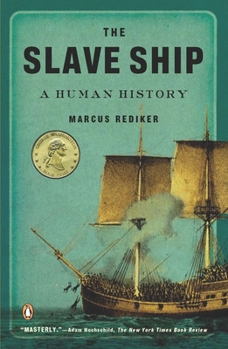The Slave Ship: A Human History
Select Format
Select Condition 
Book Overview
In this widely praised history of an infamous institution, award-winning scholar Marcus Rediker shines a light into the darkest corners of the British and American slave ships of the eighteenth century. With meticulous detail, Rediker uncovers the harsh realities of the slave trade, shedding light on the inhumane treatment of captives and the power dynamics aboard the ships. From the economic motivations driving the trade to the efforts of abolitionists, this book reveals the birth of African American culture amidst a backdrop of horror and despair. Drawing on thirty years of research in maritime archives, court records, diaries, and firsthand accounts, The Slave Ship is riveting and sobering in its revelations, reconstructing in chilling detail a world nearly lost to history: the "floating dungeons" at the forefront of the birth of African American culture. This is a powerful and important addition to the study of history, shedding light on a tragedy that should never be forgotten.
Customer Reviews
Rated 5 starsMoving account of a vile trade
Marcus Rediker, of Pittsburgh University's History Department, has written a brilliant account of the machine that enabled history's largest forced migration. Exploration, settlement, production and trade all required massive fleets of ships. The slave ships, with names like Liberty, Free Love and Delight, transported both the expropriated labourers and the new commodities that they produced. The ships were weapons, factories...
3Report
Rated 5 starsNot just for the Americas
I saw the review of this book in the WSJ and decided this was worth reading. As an African who comes from one of the major regions where slaves were taken, it was indeed a difficult read; I sometimes had to put it aside and reflect on what my people went through before, during, and after the passage. The material in this book does not just cover the history of the slaves taken to the Americas, but also the sailors and, especially,...
6Report
Rated 5 starsEye Opening Account
This is a very well documented accounting of a period of American History we would all want to forget. Each American, or would-be American will find this eye opening. There are many perspectives presented here, which, unfornately are not revealed in any other source that I've found. It puts a brand new view in front of the reader that allows a better understanding of what was considered a need for the economic development...
1Report
Rated 5 starsFasinating epic.........................
The slave ship gives a fascinating forte in the archives of slavery and the making of modern history. It was a vehicle, transporting captives whose labor was necessary for America's economic survival; it was a factory, where African men, women, and children were transformed into "cargo"; and it was an instrument of war, complete with fearsome weapons with the capability to destroy any who might challenge its gruesome mission...
3Report













